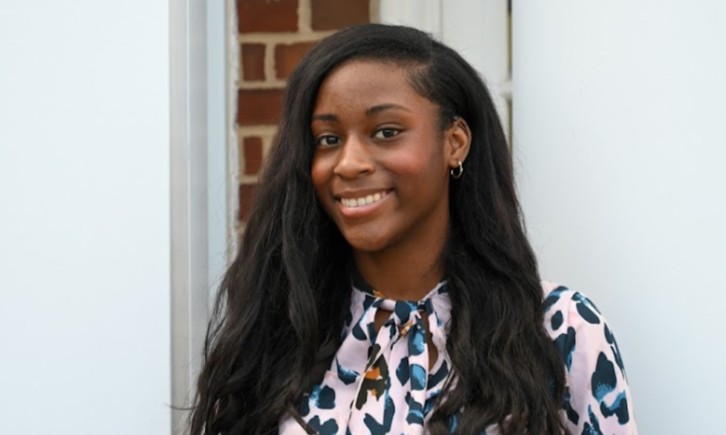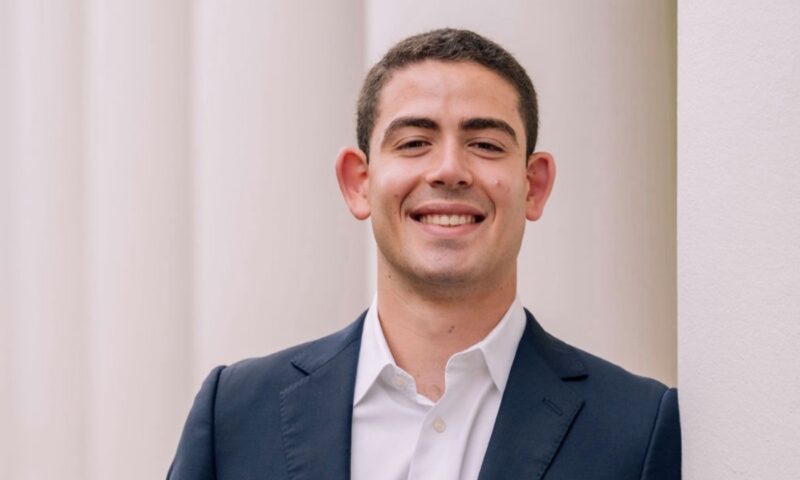Finance and Accounting concentrator Sara Walsh has learned to analyze systems and solve problems, and all the while, she’s kept the betterment of others top of mind. It’s come through in how she chose to spend her time outside of class and in her determination to carry that concern into her professional life, using the lessons from her time studying Commerce to support the advancement of ethical business practices.
Having been a Big Sister through the Young Women Leaders Program at the UVA Women’s Center, Walsh also served as a Volunteer Coordinator and Camp Counselor for Camp Kesem at UVA, the local chapter of an organization dedicated to providing free summer camp and year-round programs for children impacted by parents with cancer.
That care for others has shaped Walsh’s Commerce experience. She credits her studies with Professor Gayle Erwin, who encourages students to approach their new careers with the “Commerce for the Common Good” mentality by underscoring ethical and human components of each investment or business decision that they’ll face.
“She reminds us that numbers and returns are just one component of an investment decision, and how the decisions we make will affect real people and the broader world around us,” Walsh says, noting that focus led to many conversations with Erwin about business ethics in finance—a consideration she would like to see further implemented. “It’s important to expand that framework across more classes and contexts.”
Walsh, who most recently interned at San Francisco-based private equity firm Evergreen Services Group, kept that ethical interest in mind when she conducted her job search.
“Some of the highlights of my summer were people continuously soliciting my ideas and opinions, and lending a hand whenever I was struggling with a project or concepts—no matter how busy they were,” she recalls of the internship.
That stayed with her, and she made the choice to return to Evergreen full time as an Analyst on its Investing team, where she hopes to continue offering that type of support to mentor others as she gains experience.
“I wanted to find a place that actively prioritizes the human implications of investments and decisions, and I think I am pretty lucky to be working at a place like Evergreen next year. Every investment has a long-run horizon, making it more crucial to be good stewards of the businesses and consider the effects certain decisions have on stakeholders such as founders, employees, and customers.”
Before she takes that cross-country trek, Walsh is understandably excited to return to her hometown of Baltimore, MD, and reconnect “with family, hometown friends, and, of course, my dogs.” While still on Grounds, we took the opportunity to ask her more about why she found herself at the Commerce School, which classes most helped her to develop her personal business philosophy, and what lesson will impact the early phase of her professional journey.
What about McIntire’s Commerce program most appealed to you?
I think my interest in Commerce stems from my time working at a family-owned small business. It was fascinating to see both the technical and entrepreneurial skill sets required to build a business, while also learning the importance of being flexible and responsive to change. When I got to UVA, I wanted to build upon those learnings and apply them to a variety of contexts, and believed McIntire would be the perfect vehicle, given its focus on collaboration and novel problem-solving.
Even then, I only had a general interest in business, not really knowing which specific career or academic route was right for me. What’s special about McIntire is that it provides the flexibility to explore the different facets of commerce, not siloing students into one specific focus or path. Further, McIntire’s programs encourage students to approach situations with an expansive and integrated view. This model ended up being perfect for me, allowing me to explore and navigate my own interests, while still building a strong business acumen.
What Comm School courses have made the greatest impact on you and why?
ICE Finance with Professor Gayle Erwin and Intermediate Accounting with Professor Jasmine Wang were the most impactful for me. Given these courses were my introduction to the more technical classes at McIntire, I found it easy to get caught thinking too systematically, at the expense of the bigger picture. Both professors encouraged me to step back and focus more on the “why” rather than obsessing over the “correct” answer or way of solving things. While attention to detail is crucial, prioritizing intuition and reasoning is equally valuable. Once I felt more comfortable breaking down complex topics, I started making decisions more quickly and with greater confidence. I like to think that if I wouldn’t be able to explain a specific concept to someone with little to no finance or accounting background, then I need to spend more time with it. At the end of the day, we will all work in cross-functional teams throughout our careers, and breaking down complex concepts simply is essential to ensure everyone involved in the decision-making is on the same page. These skills were definitely put to the test while serving as a Teaching Assistant for these courses, but it was rewarding to lean on my own experiences and challenges to help other students adopt more effective approaches while tackling the challenging coursework.
In addition, both professors have been valuable mentors throughout my time at McIntire. In a community of such intelligent and driven students, it’s easy to be hard on yourself when something doesn’t click right away. Both professors reinforced to me the value of improvement over immediate results, allowing me to destigmatize asking for extra help when needed. As we start our careers, we will be absorbing a lot of new information and topics in a short period, and it’s important to be patient with ourselves and feel comfortable asking for clarification and feedback.
What’s one lesson you’ve learned at McIntire that you see yourself relying on most in your career?
I think the Comm School pushes us to be self-starters, which will prove itself valuable in our careers. During ICE, we are handed a complex problem with little direction, relying on ourselves and our groupmates to identify opportunities and devise a strategy to pursue them. In our classes, professors give us the necessary tools, while also putting a lot of trust in us to take action and produce results we are proud of. Although overwhelming at first, this autonomy became more exciting as we built up our skill sets and confidence. This transfers well to a business environment, where workflows are built around trusting your teammates and taking ownership of your work.
Aside from embracing autonomy, actively seeking out additional opportunities to learn falls under the “self-starter” toolkit developed at McIntire. Some of my most fruitful discussions have come as a result of dropping into a professor’s office hours and simply asking them to give more context to stories happening in the news. At work, taking that proactive step of asking to learn more about a function or topic that you don’t encounter on a day-to-day basis can go a long way.



